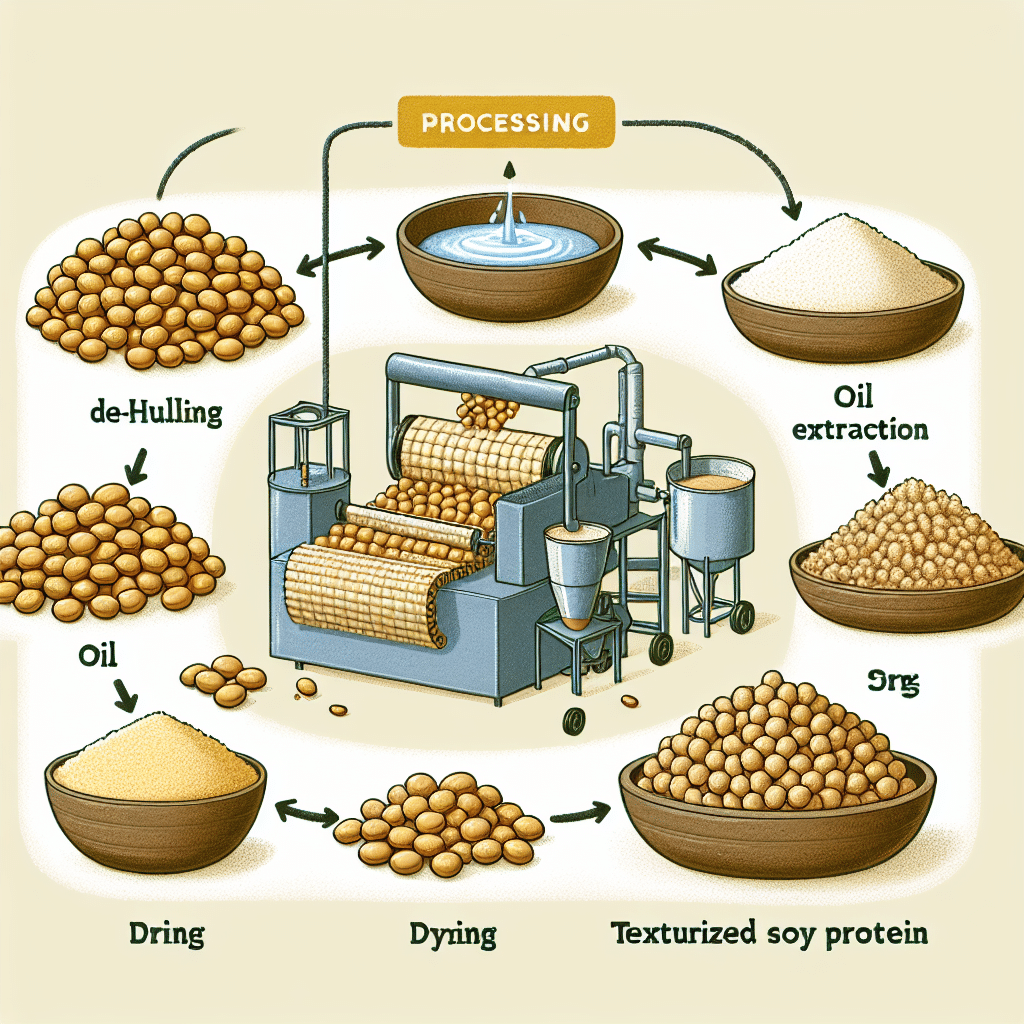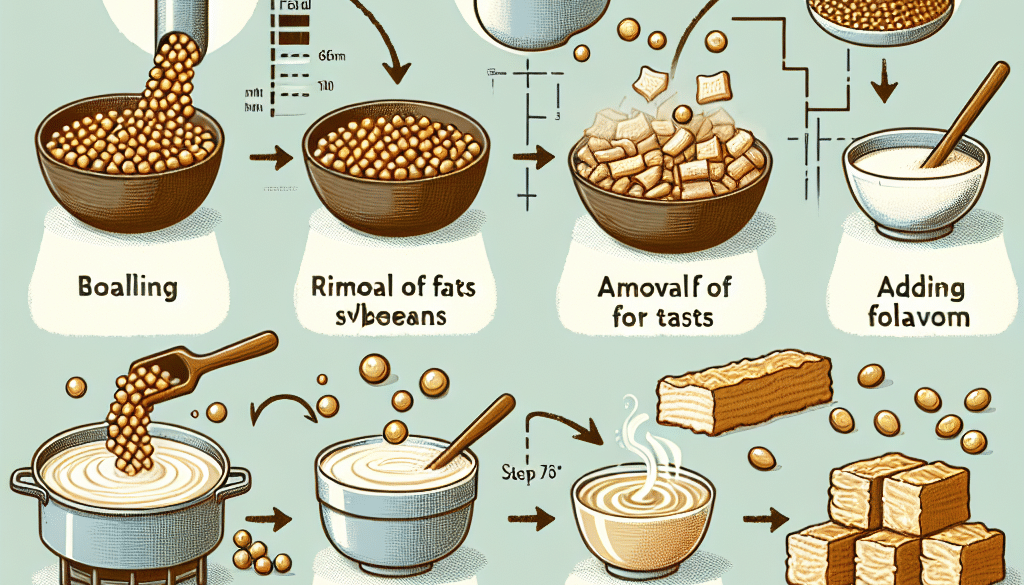How Processed Is Textured Soy Protein?
-
Table of Contents
- Textured Soy Protein: Understanding Its Processing Journey
- The Origins of Textured Soy Protein
- The Processing of Soybeans into TSP
- Health Considerations and Nutritional Profile
- Environmental Impact and Sustainability
- Case Studies and Examples
- Conclusion: The Processed Nature of TSP
- Discover ETprotein’s High-Quality Protein Products
Textured Soy Protein: Understanding Its Processing Journey

Textured Soy Protein (TSP), also known as textured vegetable protein (TVP), is a versatile food ingredient derived from soybeans. It’s widely used as a meat substitute or meat extender and has become a staple in vegetarian and vegan diets. But how processed is textured soy protein? This article delves into the journey of soybeans from the farm to the fork, exploring the various stages of processing that result in the creation of TSP.
The Origins of Textured Soy Protein
Before we can understand the processing of TSP, it’s essential to know where it comes from. Soybeans are legumes native to East Asia, and they have been cultivated for thousands of years. They are a rich source of protein and contain all the essential amino acids required by the human body, making them an excellent alternative to animal protein.
The Processing of Soybeans into TSP
The transformation of soybeans into textured soy protein is a multi-step process that involves several stages:
- Harvesting: The journey begins with the harvesting of mature soybeans.
- Cleaning and Dehulling: The harvested soybeans are cleaned to remove dirt and other impurities. The hulls are then removed to obtain the soybean kernel.
- Oil Extraction: Soybean oil is extracted from the kernels using solvent extraction or mechanical pressing, leaving behind defatted soy flour.
- Texturizing: The defatted soy flour is then subjected to a process called extrusion. During extrusion, the flour is cooked under high temperature and pressure, resulting in a fibrous, spongy matrix that resembles the texture of meat.
- Drying: The extruded product is dried to reduce moisture content, which improves shelf life and makes it easier to handle.
- Flavoring and Coloring: To enhance its appeal, TSP may be flavored and colored to mimic various types of meat.
- Packaging: Finally, the TSP is packaged and made ready for distribution to retailers and consumers.
Throughout this process, TSP can be shaped and sized into various forms, such as flakes, chunks, or granules, to suit different culinary applications.
Health Considerations and Nutritional Profile
Textured soy protein is celebrated for its high protein content and low-fat profile. It’s also a good source of fiber and essential nutrients like iron and calcium. However, as with any processed food, there are health considerations to keep in mind:
- Sodium Content: Some TSP products may contain added salt, which can increase sodium intake.
- Additives: Flavorings and colorings added to TSP may include additives that some consumers prefer to avoid.
- Allergens: Soy is a common allergen, and individuals with soy allergies should avoid TSP.
Despite these considerations, TSP remains a popular choice for those looking to reduce meat consumption or seeking plant-based protein sources.
Environmental Impact and Sustainability
The production of TSP is often touted as being more environmentally friendly than animal protein production. Soy cultivation requires less land and water and generates fewer greenhouse gases. However, concerns about the sustainability of soy production, such as deforestation and the use of genetically modified organisms (GMOs), are also part of the conversation.
Case Studies and Examples
Many food manufacturers and restaurants have successfully incorporated TSP into their products and menus. For example, popular meatless burgers and sausages often contain TSP as a primary ingredient. These products have gained significant market share, reflecting a growing consumer interest in plant-based diets.
Conclusion: The Processed Nature of TSP
In conclusion, textured soy protein is a highly processed food product. Its journey from soybean to TSP involves several stages, including cleaning, oil extraction, texturizing, and flavoring. While it is a processed food, TSP offers nutritional benefits and serves as an environmentally friendlier alternative to meat. Consumers should be mindful of the additives and sodium content in some TSP products and consider the broader implications of soy production on sustainability.
Discover ETprotein’s High-Quality Protein Products
If you’re interested in incorporating high-quality protein into your diet, consider exploring ETprotein’s range of products. ETprotein specializes in organic bulk vegan proteins and L-(+)-Ergothioneine (EGT), offering a variety of options such as rice protein, pea protein, and seed-based proteins. Their products are non-GMO, allergen-free, and come with a guarantee of purity and quality. Whether you’re a manufacturer, trader, or consumer, ETprotein can meet your protein needs with their extensive product range.
About ETprotein:
ETprotein, a reputable protein and L-(+)-Ergothioneine (EGT) Chinese factory manufacturer and supplier, is renowned for producing, stocking, exporting, and delivering the highest quality organic bulk vegan proteins and L-(+)-Ergothioneine. They include Organic rice protein, clear rice protein, pea protein, clear pea protein, watermelon seed protein, pumpkin seed protein, sunflower seed protein, mung bean protein, peanut protein, and L-(+)-Ergothioneine EGT Pharmaceutical grade, L-(+)-Ergothioneine EGT food grade, L-(+)-Ergothioneine EGT cosmetic grade, L-(+)-Ergothioneine EGT reference grade and L-(+)-Ergothioneine EGT standard. Their offerings, characterized by a neutral taste, non-GMO, allergen-free attributes, with L-(+)-Ergothioneine purity over 98%, 99%, cater to a diverse range of industries. They serve nutraceutical, pharmaceutical, cosmeceutical, veterinary, as well as food and beverage finished product distributors, traders, and manufacturers across Europe, USA, Canada, Australia, Thailand, Japan, Korea, Brazil, and Chile, among others.
ETprotein specialization includes exporting and delivering tailor-made protein powder and finished nutritional supplements. Their extensive product range covers sectors like Food and Beverage, Sports Nutrition, Weight Management, Dietary Supplements, Health and Wellness Products, and Infant Formula, ensuring comprehensive solutions to meet all your protein needs.
As a trusted company by leading global food and beverage brands and Fortune 500 companies, ETprotein reinforces China’s reputation in the global arena. For more information or to sample their products, please contact them and email sales(at)ETprotein.com today.












